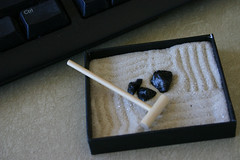hardware meditation

I post this so others don't have to go through hours of painful hardware research, not because I think it is a particularly interesting story. If you just bought a new, large harddrive which is running inexplicably slow in windows, this story is for you. If you didn't, it's not.
The players in this particular story are a 250GB Seagate drive, a K7AMA ECS motherboard with an ALi chipset on it. The problem is, the harddrive runs extremely slow. And I mean extremely, about 15 times slower than the old, small one it was meant to replace.
Whenever you try to solve a simple hardware problem, like a harddrive running slowly, you invariably learn more about hardware than you wanted to know. You even learn more than your brain is capable of learning. It's a mystery.
In this case, what I learned is that there are numerous operating modes for harddrives under windows. THere are several DMA and Ultra DMA modes, conveniently numbered for easy reference, and something dreadful called PIO. You don't want PIO. But whenever something goes wrong with your harddrive, windows reduces the number of your DMA mode by one, and if enough things have gone wrong, and there are no more DMAs left to take away, to PIO you go. This is pretty much the only thing that comes up on first google searches of the problem, but unfortunately this has nothing to do with the problem. There should be a name for the particular feeling you get when you tracked down a solution for a nasty problem and realize it doesn't work; that quick, thorough switch from elation to dread. I'll call it Metus Repens, because latin sounds cool.
Just for the record: if your drive is ever stuck in PIO because of past errors, uninstalling the IDE channel it's on will probably fix it. Or it might not. Good luck.
But fortunately we're dealing with something else here. Upon booting, the BIOS properly reported the drive as UDMA 5 capable, and S.M.A.R.T., both of which Windows proved W.R.O.N.G.. But there was a small hint indicating that this was not a problem specific to windows. When autodetecting the drive in the BIOS setup, it was identified as a 137GB drive, which is a magical limit for some reason or another. If the BIOS didn't properly recognize the drive, maybe there is some hardware issue windows is struggling with.
So now I did a Google search on K7AMA, PIO and hard drive, and indeed found about a dozen other people stuck with the same problem. There should be a name for that feeling, as well: the realization that your problem is common and does not have a solution. Its about the same feeling people must get when they are told they have an incurable disease. Horror Fatui. I'm not sure that's even proper Latin, but it sounds good, so it'll do.
What it came down to is that the cheapass chipset that ECS chose to put on the K7AMA motherboard does not, when run with its original drivers, like large disks. While both IDE channels should be fully capable of UDMA 5, they actually are not. And since the chipset is cheapass, there are no updated drivers to be found, anywhere. Not on ECS's website, which has everything but the IDE drivers, not on ALi's, which inexplicably doesn't offer any downloads at all, but still has a few references to a drivers section strewn through the pages, all dead links, of course. Bastards.
At that stage I discovered this page, just because I had been searching for hours. Tracking it down again for linking to it just cost me fifteen minutes, in spite the fact that I knew it existed and remembered many keywords and that it was on a .edu server. This site had the ALi integrated IDE driver in a version compatible with my ALi chipset. I don't know where the author got it from, and I don't know why it changed both my IDE channels to SCSI, but I don't care much either, since installing it fixed the speed problems.
I'm glad I got that off my chest. Aren't you, too?
PS Sorry to add this, but after a few days of operationality, the PC died the true death. I suspect something in the mainboards IDE bridge circutiry was fried, but I can't be sure. I've replaced the mainboard, reinstalled Windows, and everything's fine now. So was it all for naught? Yes.


0 Comments:
Post a Comment
<< Home